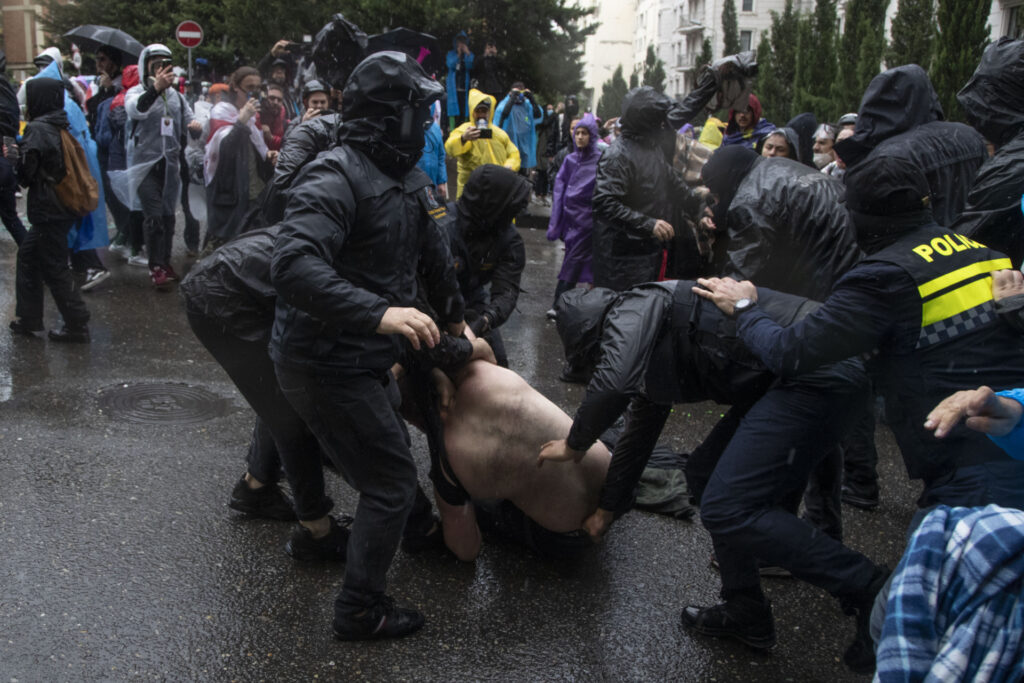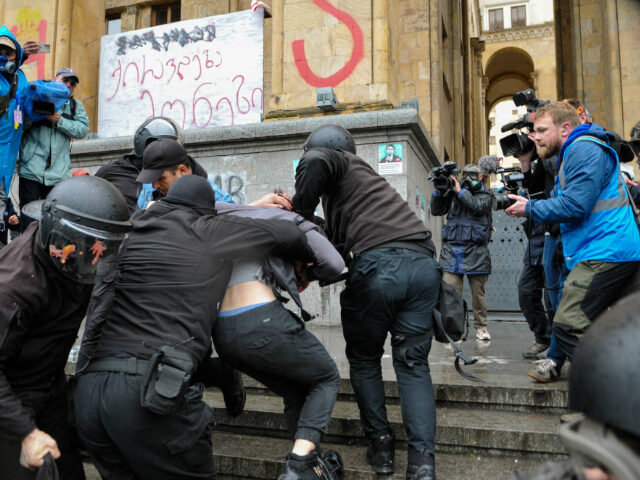The legislature of Georgia approved a controversial “foreign agent” law on Tuesday despite massive protests in the streets and vicious fistfights breaking out on the floor of parliament.
Protesters unsuccessfully tried to force their way into the parliament building after the vote was announced, prompting fresh clashes with the police.
The bill passed by a vote of 84-30 during all this conflict, with a large number of abstentions, setting up a likely veto showdown with President Salome Zourabichvili. The president vowed to use her veto against the law, but the ruling Georgian Dream Party has enough strength in parliament to override her veto.
Zourabichvili is a staunch opponent of Prime Minister Irakli Kobakidze, who said on Monday that if the bill did not become law, Georgia would lose its sovereignty and “easily share the fate of Ukraine,” suggesting a possible invasion by Russian forces.
The Biden White House said it was “deeply troubled” by the “Kremlin-style” foreign agent law, threatening to “fundamentally reassess our relationship with Georgia” if it passes.
“If the law goes forward without conforming to EU norms and this kind of rhetoric and aspersions against the U.S. and other partners continue, I think the relationship is at risk,” said Assistant Secretary of State James O’Brien, who was in the Georgian capital of Tbilisi when the vote was held.
O’Brien said the U.S. response could include financial sanctions and travel restrictions against Georgian leaders, especially if security forces continue to use excessive violence against protesters.

Demonstrators clash with police as two Americans and one Russian citizen are among 20 detained during a protest against the foreign agent law on May 13, 2024, in Tbilisi, Georgia. (Daro Sulakauri/Getty Images)
The European Union (EU) on Wednesday urged Georgia to scuttle the foreign agent bill, warning that the country’s ambitions to join the EU and NATO could be ruined if the bill is signed into law.
“The adoption of this law negatively impacts Georgia’s progress on the EU path. The choice on the way forward is in Georgia’s hands. We urge the Georgian authorities to withdraw the law,” said a statement from EU foreign policy head Josep Borrell and the European Commission.
Lithuanian President Gitanas Nauseda issued a statement of support for the protesters on Tuesday.
“Dear Georgian people, we hear you and stand with you in your struggle for the European future of Georgia. Nobody has the right to take your European dream away. Nobody has the right to silence the will of the people to live by values,” Nauseda said.
The statement reminded Georgia that the European Commission has “clearly and repeatedly stated that the spirit and content of the law are not in line with EU core norms and values.”
Georgia has seen some of its largest public demonstrations since escaping from the Soviet Union in 1991 over the foreign agent law, with thousands filling the streets of Tbilisi and other cities. Dozens of injuries were reported on Tuesday, including some from tear gas inhalation.
The Georgian Dream Party attempted to pass a similar law in March 2023, abandoning the effort after tens of thousands of demonstrators swarmed the national capital. Eyewitnesses said the crowds on Tuesday were even larger, but, this time, the bill was hammered through.
The foreign agent law stipulates that any organization receiving more than 20 percent of its funding from outside Georgia must register as an agent of foreign influence, accepting heavy compliance burdens, intrusive disclosure requirements, and the threat of massive fines for violations.
As the White House noted, Russia’s authoritarian President Vladimir Putin has used similar laws to silence critical media and crush opposition groups. Opponents of the Georgia bill often refer to it as the “Russian law” or “Putin law” to emphasize this similarity.
France24 noted on Monday that ugly prejudice against non-governmental organizations (NGOs) is building in Georgia, egged on by the ruling party and its supporters.
Giorgi Oniani, deputy managing director of an anti-corruption NGO based in Germany called Transparency International, said his home has been covered with posters calling him an “enemy of the Church,” “enemy of the state,” “LGBT propagandist,” and “foreign spy”:
[The authorities] are the ones who put it up, who are intimidating us. They’re doing everything they can to disrupt our work. All this took place in a group of buildings that is supposed to be protected because the prime minister lives there. But we discovered that the surveillance cameras were switched off. I called the police in the early hours but they refused to come and register my complaint.
“Everything happened very quickly. The pace of repression has accelerated very quickly, to the point where we now feel like we’re living in Belarus,” he said. “You ask me how the ‘foreign influence’ law is going to affect us but it’s already affecting us. It affects me and my family.”
Other NGOs reported similar levels of harassment. They noted that, since they rely on foreign contributions to finance assistance for oppressed Georgians, the foreign agent law would make it very difficult for them to continue.

COMMENTS
Please let us know if you're having issues with commenting.